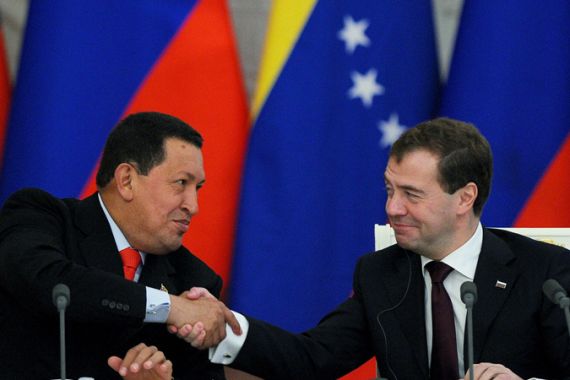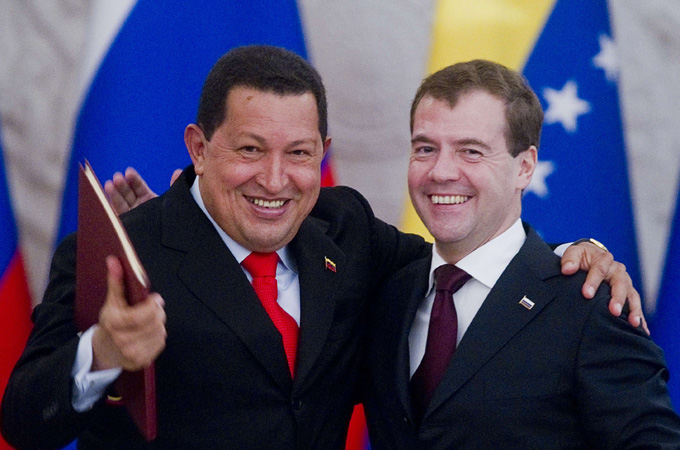Chavez signs nuclear deal in Russia
Russia to build Venezuela’s first nuclear power plant and buy $1.6bn of oil assets.

 |
| Russia has agreed to build Venezuela’s first nuclear power plant and buy $1.6bn of oil assets [AFP] |
Hugo Chavez, the Venezuelan president, has reached a deal with Russia that it will build the Latin American country’s first nuclear plant.
The deal was signed on Friday at a Kremlin ceremony with Dmitry Medvedev, the Russian president, who said the countries shared a “strategic partnership” and a vision of a world free of overwhelming US influence.
Keep reading
list of 4 itemsWorld’s coral reefs face global bleaching crisis
Why is Germany maintaining economic ties with China?
Australia’s Great Barrier Reef suffers worst bleaching on record
“Both Russia and Venezuela favour the development of a modern and just world order, a world order in which our future does not depend on the will or desire of any one country, its well-being or its mood,” Medvedev said.
After the presidents’ talks, Sergei Kiriyenko, the Russian nuclear agency chief, and Nicolas Maduro, the Venezuelan foreign minister, signed a deal on “the construction and use of an atomic power station on the territory of Venezuela”.
The ITAR-Tass news agency said Russia plans to build two 1,200 mega watt nuclear reactors at the Venezuelan plant.
The deal is likely to raise concern in the US administration but follows a pattern of Russia pressing to export its nuclear expertise.
Al Jazeera talked to Dimitry Babich, a political commentator, on the deal and he said: “the nuclear plant deal is a very good development, because Russia has a problem finding markets for its nuclear industry, and Russian power stations are widely appreciated in some development countries.” he said.
Strategic co-operation
Russia has just completed Iran’s first nuclear power plant and recently reached new deals to build nuclear reactors in China and Turkey. It is negotiating with officials in India about building a dozen of nuclear reactors there and also wants to build a nuclear reactor in the Czech Republic.
Medvedev said Russia sees nuclear energy as a priority, despite its own hydrocarbon wealth, and described Russia’s civilian nuclear technology as highly competitive abroad.
“We are building many plants in different countries, so why wouldn’t we build such a plant in our close partner, Venezuela?,” he said.
“That will offer a certain degree of independence in case of a drop in world energy prices.”
Chavez said Venezuela wants to reduce its dependence on oil and gas and praised Russia for helping his country.
“Strategic co-operation with Russia gives my country a huge advantage,” he said.
Russia also secured a deal for its biggest oil company, Rosneft, to buy Venezuelan state oil company PDVSA’s stake in four German refineries.
State-controlled Rosneft said it would pay $1.6 bn for a 50 per cent stake in the Ruhr Oel refineries, which PDVSA owns jointly with Britain’s BP. With a total capacity of 1.04 million barrels per day, the refineries are Venezuela’s biggest refining assets in Europe.
Moscow tilt
Chavez has grown increasingly close to Russia, Iran and China while criticising US policies, and his rhetoric about the need for a “multi-polar world” has resonated in Moscow.
“Russia and Venezuela staunchly support the creation of modern and fair world order, so that our future does not depend on the will and the liking of just one country, its welfare and mood,” Medvedev said.
Chavez’s government has bought more than $4bn in Russian weapons since 2005, including jet fighters, helicopters and 100,000 Kalashnikov rifles.
New weapons deals have been under discussion, but no new agreements were announced on riday.
Russia and Venezuela have also launched a joint business to tap vast oil deposits in eastern Venezuela.